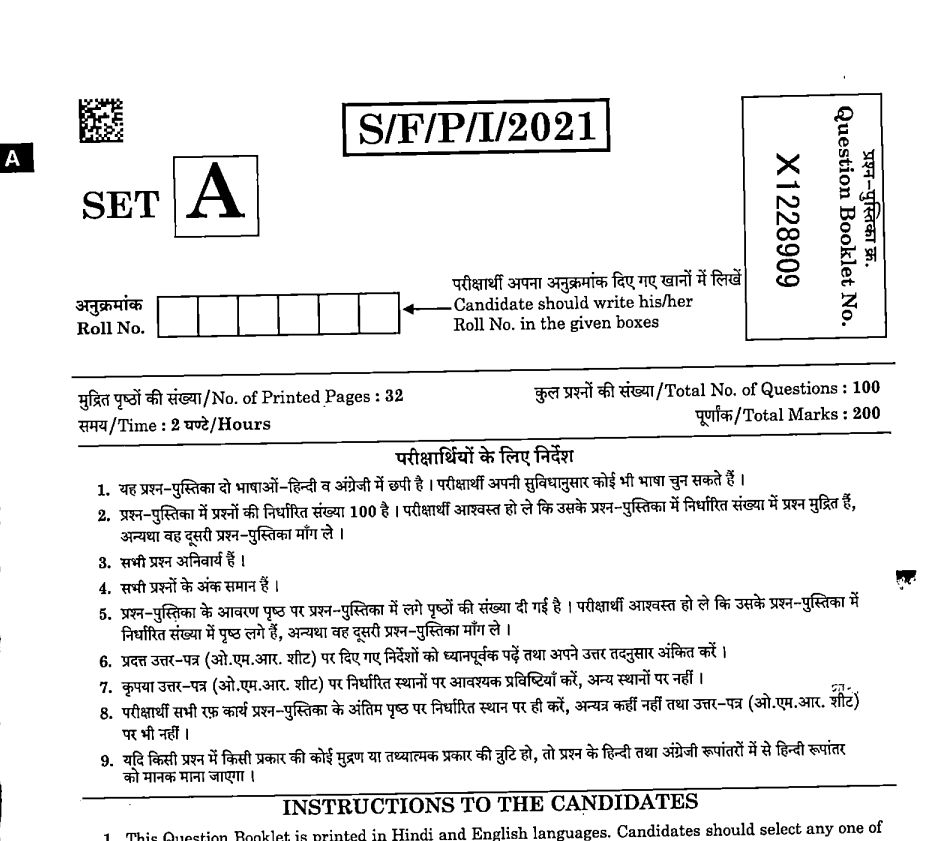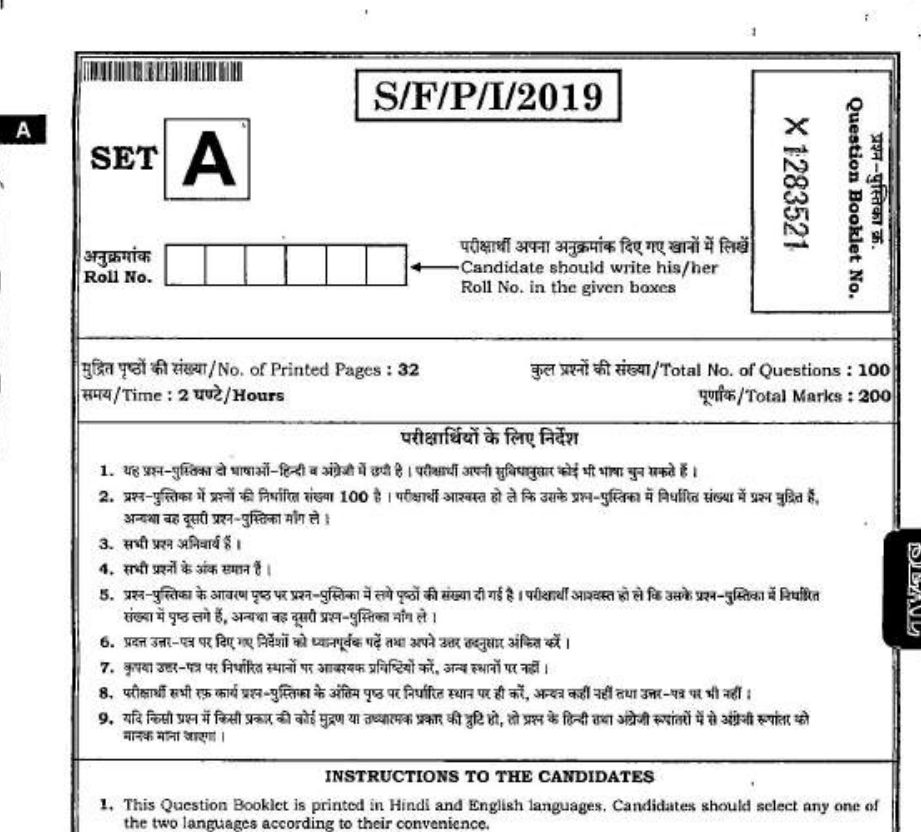Madhya Pradesh Public Service Commission, or MPPSC previous year paper, is a state government-owned and managed organization in Madhya Pradesh that was established in 1956. MPPSC conducts civil service and other competitive examinations. MPPSC conducts entrance exams for various jobs within the state and they are held once a year. MPPSC is responsible for the direct recruitment of Civil services, promotions of state-level officers, and transfers of Civil services from one department to another.
Overview: MPPSC previous year paper
MPSSC is expanded as Madhya Pradesh Public Service Commission. Madhya Pradesh is one of the important states of India: It has been giving wider opportunities for young candidates in field of government exams. MPSSC is in charge for conducting various government job exams for the state. Public Service Commission is an authorized council for the state of MP and it is involved in the production of various annual competitions. The main aim of this commission is to conduct recruitment process and select aspirants based on their talent in to the commission.
| Eligibility | ||
|---|---|---|
| Minimum age | 21 years | |
| Maximum age | 40 years for Madhya Pradesh residents, 30 years for others (exceptions apply) | |
| Educational qualification | Graduation from a recognized university | |
| Selection Process (Three Stages) | ||
| Preliminary Exam | Objective type (MCQs) on General Studies and General Aptitude. | |
| Main Exam | Written tests on various subjects relevant to the chosen civil service post. | |
| Interview | Assessment of personality, suitability, and communication skills. | |
| Exam Dates (2024) | ||
| Application Window | January 19th – February 18th, 2024 (Closed) | |
| Prelims Exam Date | April 28th, 2024 | |
Download: MPPSC previous year paper


| MPPSC previous year paper Download | ||
| Paper Title | Year of Exam | Paper with solution |
|---|---|---|
| Prelims Examination | 2016 | Download@5Rs |
| Prelims Examination | 2019 | Download@5Rs |
| Prelims Examination | 2021 | Download@5Rs |
| Prelims Examination | 2022 | Download@5Rs |
Exam Pattern: MPPSC previous year paper
| S. No | Paper | Topic | Marks | Time Duration |
|---|---|---|---|---|
| 1 | Paper I | General studies – I | 300 | 3 hours |
| 2 | Paper II | General studies – II | 300 | 3 hours |
| 3 | Paper III | General studies – III | 300 | 3 hours |
| 4 | Paper IV | General studies – IV | 300 | 3 hours |
| 5 | Paper V | General Hindi | 300 | 3 hours |
| 6 | Paper VI | English | 100 | 3 hours |
Tips for Good Preparation
- Learn Syllabus Carefully: Learn every topic covered in the syllabus, including the chapters, poetry, grammatical rules, and composition subjects. Make sure you are prepared for the exam.
- Frequent Practice: To enhance your abilities, practice writing assignments and reading comprehension on a frequent basis.
- Concentrate on Writing: Writing abilities should receive particular attention because they are essential to achieve high exam scores. Write stories, letters, and essays as practice to get good marks in the writing section.
- Solve Previous Year Question Papers: Examine past year’s question papers to gain insight into the format and nature of the questions. It will also assist you with time management.
Revise Often: To help you remember material and enhance your comprehension, go back and review chapters, poetry, and grammar rules on a frequent basis. - Remain Positive and Confident: Remain upbeat and assured of your skills. Have faith in your readiness and in yourself.
- Maintain Your Health: Make sure you’re eating right, getting enough sleep, and exercising on a regular basis. A sound body promotes a sound mind, which is necessary for studying for exams.
Common Challenges: MPPSC previous year paper
Starting an educational path frequently means facing typical obstacles that learners face. Identifying these obstacles is the first step in creating winning plans to get over them. Here, we examine a few common issues that students encounter:
- Time management: It might be difficult to strike a balance between extracurricular activity and academic obligations. It can be difficult for students to set aside enough time for each topic or to stick to a regular study schedule.
- Procrastination: The propensity to put off work can make progress difficult. Procrastination frequently stems from a lack of drive or a sense of overwhelm, which makes it difficult to make the most of study time.
- Subject Comprehension: It might be difficult to understand complicated ideas, particularly in areas like science or mathematics. Inadequate study materials or unclear teaching strategies could be part of the problem.
- Exam Anxiety: People frequently struggle with anxiety and nervousness before exams. Stress levels can rise as a result of performance pressure, exam format confusion, or fear of failing.
- Distractions: Social interactions, technological diversions, or a disorganized study space can take attention away from concentrated study periods, which can affect focus and productivity.
- Lack of Resources: Insufficient study materials or restricted access to resources may make thorough preparation difficult. Students that encounter this obstacle could find it difficult to locate additional resources or different teaching aids.
- Motivation and Burnout: It might be difficult to maintain motivation for an extended amount of time. Burnout is a condition marked by physical and mental tiredness and can be brought on by persistently demanding academic work under pressure.
Enhance your exam readiness, consider these strategies
Exam preparation is more than just learning new material; it’s also about using practical techniques that improve your general preparedness. To guarantee that you enter the examination room confident and well-prepared, think about the following tactics:
- Arrangement of Study Materials: Create a comprehensive study schedule that includes all of your disciplines. Divide your reading material into digestible chunks and set aside particular times for each subject. This reduces cramming at the last minute and guarantees thorough coverage.
- Frequent Editing Sessions: Plan frequent review sessions to help you remember what you’ve learned. Exam recall is improved and memory retention is aided by spaced repetition.
- Mock tests: Examine test conditions by using the 2019 7th Standard Question Paper. Test yourself in a timed environment to get a feel for the exam’s pressure. Examine your performance to see what needs to be improved.
- A Well-Being Lifestyle: Make healthy living a priority. This includes eating a balanced diet, getting regular exercise, and getting enough sleep. Physical health supports mental clarity and improves focus in general.
- Strategies for Active Learning: Take part in study groups, impart knowledge to others, summarize, and other active learning strategies. Active learning promotes a dynamic approach to studying and strengthens understanding.
- Methodical Approach to Examining: Become familiar with the format of the exam and devise a plan of attack for each type of question. Sort the questions according to priority, time, and difficulty.
- Positivity in Thought: Maintain an optimistic outlook. Have faith in your readiness and skills. Having positive ideas helps boost confidence, which is necessary for achieving the best possible results on exams.
FAQ's: MPPSC previous year paper
Q- What is MPPSC?
A- MPPSC stands for Madhya Pradesh Public Service Commission. It is a state government organization responsible for conducting various competitive examinations for recruitment to various posts in the state government.
Q- How can I apply for MPPSC exams?
A- The application process for MPPSC exams is conducted online through the official website of MPPSC. Candidates need to register, fill out the application form, upload documents, and pay the application fee online.
Q- Is there any negative marking in MPPSC exams?
A- Yes, there is negative marking in the Preliminary Examination of MPPSC. For each incorrect answer, 1/3rd of the marks assigned to that question are deducted as penalty.
Q- How can I prepare for MPPSC exams?
A- To prepare for MPPSC exams, candidates should follow a structured study plan, focus on understanding the concepts, practice previous year question papers, and stay updated with current affairs.






